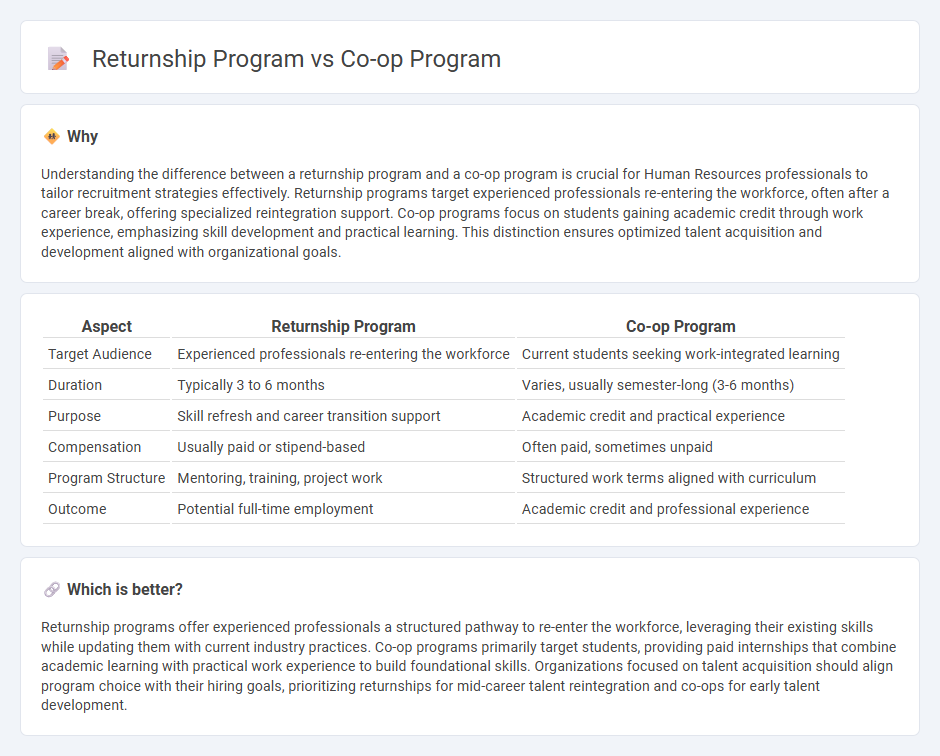
Returnship programs offer mid-career professionals a structured pathway to re-enter the workforce after a hiatus, focusing on skill refreshment and industry re-acclimation. Co-op programs target students and recent graduates with integrated work-study experiences designed to enhance academic learning through practical application. Explore how these programs can strategically benefit talent acquisition and organizational growth.
Why it is important
Understanding the difference between a returnship program and a co-op program is crucial for Human Resources professionals to tailor recruitment strategies effectively. Returnship programs target experienced professionals re-entering the workforce, often after a career break, offering specialized reintegration support. Co-op programs focus on students gaining academic credit through work experience, emphasizing skill development and practical learning. This distinction ensures optimized talent acquisition and development aligned with organizational goals.
Comparison Table
| Aspect | Returnship Program | Co-op Program |
|---|---|---|
| Target Audience | Experienced professionals re-entering the workforce | Current students seeking work-integrated learning |
| Duration | Typically 3 to 6 months | Varies, usually semester-long (3-6 months) |
| Purpose | Skill refresh and career transition support | Academic credit and practical experience |
| Compensation | Usually paid or stipend-based | Often paid, sometimes unpaid |
| Program Structure | Mentoring, training, project work | Structured work terms aligned with curriculum |
| Outcome | Potential full-time employment | Academic credit and professional experience |
Which is better?
Returnship programs offer experienced professionals a structured pathway to re-enter the workforce, leveraging their existing skills while updating them with current industry practices. Co-op programs primarily target students, providing paid internships that combine academic learning with practical work experience to build foundational skills. Organizations focused on talent acquisition should align program choice with their hiring goals, prioritizing returnships for mid-career talent reintegration and co-ops for early talent development.
Connection
Returnship programs and co-op programs both serve as structured pathways to re-enter or enter the workforce, targeting individuals seeking practical experience and skill development. Returnships primarily support professionals returning after career breaks, providing tailored mentorship and real-world project involvement, while co-op programs integrate academic study with paid work terms for students. Both initiatives enhance talent pipelines by fostering hands-on learning, increasing employability, and facilitating smoother transitions into full-time roles within Human Resources management and other corporate functions.
Key Terms
**Co-op Program:**
Co-op programs provide students with structured, paid work experiences directly related to their academic field, integrating classroom learning with practical application over multiple semesters. These programs often require formal enrollment and offer academic credit, enabling students to build professional skills and industry connections before graduation. Explore how co-op programs can accelerate your career development and academic success.
Experiential Learning
Co-op programs immerse students in structured, paid work placements directly related to their academic fields, enhancing practical skills and professional networking during their studies. Returnship programs, tailored for professionals re-entering the workforce after a career break, offer project-based roles emphasizing skill refreshment and industry reintegration. Explore the unique benefits of co-op and returnship programs to boost experiential learning opportunities.
Academic Credit
Co-op programs primarily target current students seeking academic credit through structured work placements integrated with their academic curriculum. Returnship programs, however, focus on career re-entry for experienced professionals and typically do not offer academic credit. Explore the key differences and benefits of each to determine the best fit for your career goals.
Source and External Links
Co-op Programs at New York Tech - New York Tech offers co-op programs combining academic study with full-time employment in fields like computer science and engineering, providing students with real-world experience and career development opportunities.
UB School of Engineering Co-op Information - The University at Buffalo's co-op program allows engineering students to gain full-time work experience related to their degree, typically lasting 6-9 months, which can delay graduation but offers academic credit and potential employment opportunities.
Cooperative Education on Wikipedia - Cooperative education, or co-op, is a structured method of combining classroom-based learning with practical work experience, providing academic credit and enhancing students' transition to the workforce through partnerships between schools and employers.
 dowidth.com
dowidth.com